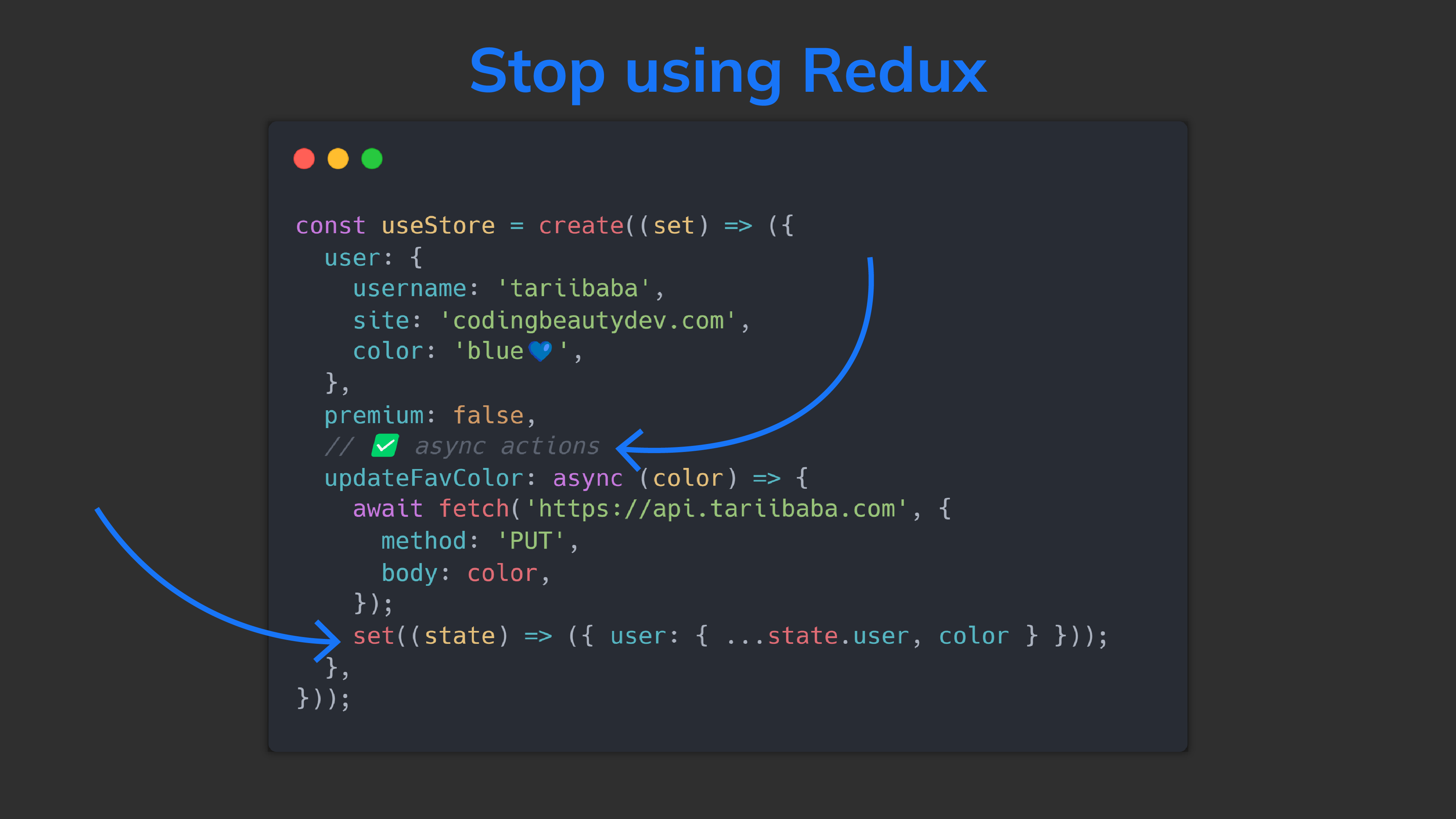The new Zustand library changes everything for state management in web dev.
The simplicity completely blows Redux away. It’s like Assembly vs Python.
Forget action types, dispatch, Providers and all that verbose garbage.
Just use a hook! 👇
import { create } from 'zustand';
const useStore = create((set) => ({
count: 0,
increment: () => set((state) => ({ count: state.count + 1 })),
}));Effortless and intuitive with all the benefits of Redux and Flux — immutability, data-UI decoupling…
With none of the boilerplate — it’s just an object.
Redux had to be patched with hook support but Zustand was built from the ground up with hooks in mind.
function App() {
const store = useStore();
return (
<div>
<div>Count: {store.count}</div>
<button onClick={store.increment}>Increment</button>
</div>
);
}
export default App;Share the store across multiple components and select only what you want:
function Counter() {
// ✅ Only `count`
const count = useStore((state) => state.count);
return <div>Count: {count}</div>;
}
function Controls() {
// ✅ Only `increment`
const increment = useStore((state) => state.increment);
return <button onClick={increment}>Increment</button>;
}Create multiple stores to decentralize data and scale intuitively.
Let’s be real, that single-state stuff doesn’t always make sense. And it defies encapsulation.
It’s often more natural to let a branch of components have their localized global state.
// ✅ More global store to handle the count data
const useStore = create((set) => ({
count: 0,
increment: () => set((state) => ({ count: state.count + 1 })),
}));
// ✅ More local store to handle user input logic
const useControlStore = create((set) => ({
input: '',
setInput: () => set((state) => ({ input: state.input })),
}));
function Controls() {
return (
<div>
<CountInput />
<Button />
</div>
);
}
function Button() {
const increment = useStore((state) => state.increment);
const input = useControlStore((state) => state.input);
return (
<button onClick={() => increment(Number(input))}>
Increment by {input}
</button>
);
}
function CountInput() {
const input = useControlStore((state) => state.input);
return <input value={input} />;
}Meet useShallow(), a powerful way to get derived states — instantly updates when any of original states change.
import { create } from 'zustand';
import { useShallow } from 'zustand/react/shallow';
const useLibraryStore = create((set) => ({
fiction: 0,
nonFiction: 0,
borrowedBooks: {},
// ...
}));
// ✅ Object pick
const { fiction, nonFiction } = useLibraryStore(
useShallow((state) => ({
fiction: state.fiction,
nonFiction: state.nonFiction,
}))
);
// ✅ Array pick
const [fiction, nonFiction] = useLibraryStore(
useShallow((state) => [state.fiction, state.nonFiction])
);
// ✅ Mapped picks
const borrowedBooks = useLibraryStore(
useShallow((state) => Object.keys(state.borrowedBooks))
);And what if you don’t want instant updates — only at certain times?
It’s easier than ever — just pass a second argument to your store hook.
const user = useUserStore(
(state) => state.user,
(oldUser, newUser) => compare(oldUser.id, newUser.id)
);And how about derived updates based on previous states, like in React’s useState?
Don’t worry! In Zustand states update partially by default:
const useStore = create((set) => ({
user: {
username: 'tariibaba',
site: 'codingbeautydev.com',
color: 'blue💙',
},
premium: false,
// `user` object is not affected
// `state` is the curr state before the update
unsubscribe: () => set((state) => ({ premium: false })),
}));It only works at the first level though — you have to handle deeper partial updates by yourself:
const useStore = create((set) => ({
user: {
username: 'tariibaba',
site: 'codingbeautydev.com',
color: 'blue💙',
},
premium: false,
updateUsername: (username) =>
// 👇 deep updates necessary to retain other object properties
set((state) => ({ user: { ...state.user, username } })),
}));If you don’t want it just pass the object directly with true as the two arguments.
const useStore = create((set) => ({
user: {
username: 'tariibaba',
site: 'codingbeautydev.com',
color: 'blue💙',
},
premium: false,
// Clear data with `true`
resetAccount: () => set({}, true),
}));Zustand even has built-in support for async actions — no need for Redux Thunk or any external library.
const useStore = create((set) => ({
user: {
username: 'tariibaba',
site: 'codingbeautydev.com',
color: 'blue💙',
},
premium: false,
// ✅ async actions
updateFavColor: async (color) => {
await fetch('https://api.tariibaba.com', {
method: 'PUT',
body: color,
});
set((state) => ({ user: { ...state.user, color } }));
},
}));It’s also easy to get state within actions, thanks to get — the 2nd param in create()‘s callback:
// ✅ `get` lets us use state directly in actions
const useStore = create((set, get) => ({
user: {
username: 'tariibaba',
site: 'codingbeautydev.com',
color: 'blue💙',
},
messages: [],
sendMessage: ({ message, to }) => {
const newMessage = {
message,
to,
// ✅ `get` gives us `user` object
from: get().user.username,
};
set((state) => ({
messages: [...state.messages, newMessage],
}));
},
}));It’s all about hooks in Zustand, but if you want you can read and subscribe to values in state directly.
// Get a non-observed state with getState()
const count = useStore.getState().count;
useStore.subscribe((state) => {
console.log(`new value: ${state.count}`);
});This makes it great for cases where the property changes a lot but you only need the latest value for intermediate logic, not direct UI:
export default function App() {
const widthRef = useRef(useStore.getState().windowWidth);
useEffect(() => {
useStore.subscribe((state) => {
widthRef.current = state.windowWidth;
});
}, []);
useEffect(() => {
setInterval(() => {
console.log(`Width is now: ${widthRef.current}`);
}, 1000);
}, []);
// ...
}Zustand outshines Redux and Mobx and all the others in almost every way. Use it for your next project and you won’t regret it.
11 Amazing New JavaScript Features in ES13
This guide will bring you up to speed with all the latest features added in ECMAScript 13. These powerful new features will modernize your JavaScript with shorter and more expressive code.

